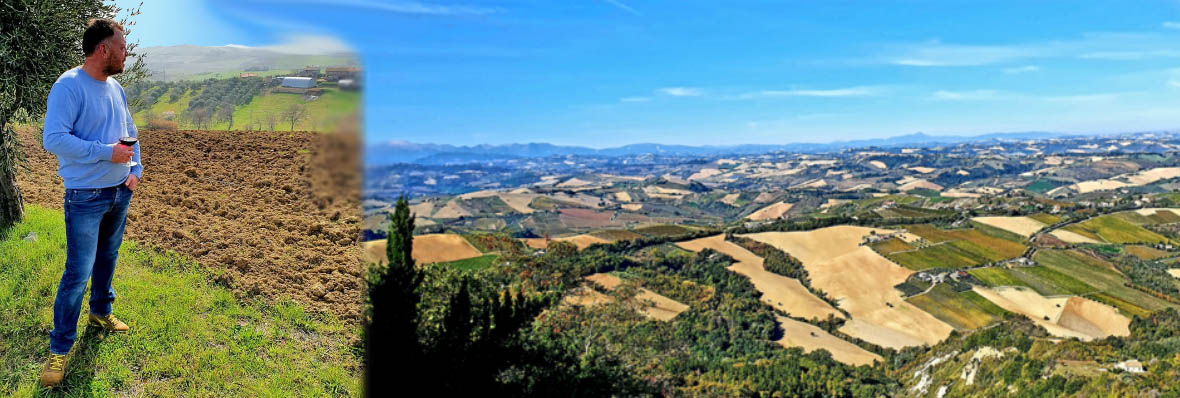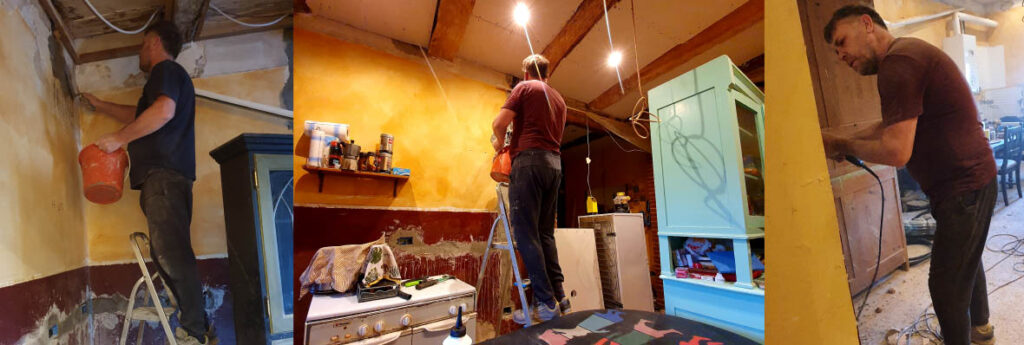‘Whose bright idea was this?’ I find myself pondering at least a hundred times a day. Moving from a pristine luxury home in England to what is now a 13th-century building site, is not for the faint of heart. “It’ll be all worth it in the end,” says my partner, Simon. He downs his coffee, grimaces, then leans out the kitchen door, spitting out a bit of concrete he found at the bottom of this mug.
It’s all been a massive lesson in Italian property law, supervising unmanageable tradesmen via Google Translate, making do, learning new skills, and not killing one another – all whilst under Covid restrictions.
The sparky
Renovating a house and not speaking the lingo often leads to moments of hilarity; like when arranging for a local tradesman to rewire the kitchen. The work was meant to commence the following Monday, he chose instead to start four days earlier. Despite being unprepared for the sudden onslaught of tradesmen, we hurriedly moved and covered furniture (which was a total waste of time as dust gets everywhere) – but who would stand in the way of progress.
The amiable electrician made the task at hand sound so easy – take the old wires out, put new ones in. Five days of wall drilling, and billowing clouds of cement dust, is not what was expected. It’s been some time since I last lived on a building site, but quickly adapted to washing dishes between buckets of building debris and cooking with wet concrete slopping off walls onto the make-shift stove.
YouTube to the rescue
It’s remarkable what one can learn by watching a 5-minute YouTube video, as Simon, an engineer by trade, is now also a dab hand at plastering. When undertaking a renovation project like this – which is what this has turned out to be – it’s crucial to having your own version of Simon, a man that can turn his hand to anything. Had we relied on tradesmen we’d have run out of funds within a short space of time. So, to all you single gals out there, considering a similar project, I have a stud for hire!
The chicken coop
Thus far the 13th-century ceiling beams in the bathroom, study, and kitchen, have been exposed, treated then clad either side with plasterboards and flush ceiling lights. The former split level chicken coop has been converted to a high spec utility room; and now that the electrics are done, Simon will be doing the rest. In the kitchen alone, he’s tasked at doing the plumbing, moving the boiler (to the utility room) plastering, then painting the walls, laying the floor tiles, assembling and installing the kitchen units, as well as connecting up a magnificent Arada multi-fuel burning stove that has a place in the kitchen’s fireplace alcove. Then there are three further bathrooms, a basement to be turned into a studio flat for visiting friends, and a cellar with gothic 13th-century arches that need to be renovated and converted to an entertainment area.
Doing business
I consider myself to be every salesperson’s dream customer. Like when I walked into a tile shop, found what I wanted, went home, triple checked the measurements, got Simon’s approval of my choice, then placed the tile order via WhatsApp – providing my code di fiscal (which is always required) and bank details. Then I anxiously wait for a confirmation email with a delivery date. And I wait, and wait some more. I explained my dismay to Andrea and Riccardo at our local builders’ merchant and learned that I need travel no further than my own village, as they have it all. I suspect we’ll soon become one of their favourite customers.
It’s not as it appears
We had prepared ourselves for just a few cosmetic changes as the sellers had assured us that the house was in tip-top condition. Taking them, and the estate agent, at face value we signed a lease contract stating that we’re buying the house ‘as seen’ and will purchase it outright in two years. I’d subsequently learned from a Notary that the contract was not worth the paper it was written on as it had not been lodged. He suggested I move post-haste to buying the property, if this is what I still wanted to do.
Lesson learned
I also learned that I should have demanded a ‘habitational certificate’, which provides a combined report on the structure, electrics, plumbing, and heating – ensuring the house passes the basic health and safety requirements. You’d expect all this to be in place before a house is put on the market to rent or buy, right? As you would an internal diagram giving the layout and measurement of each room. Not here! The latter only takes place once Notaries get involved. The sellers now need to request the local council to send a building surveyor around who will no doubt note works done without the official sanction.
Living the dream
At sunset, following a day of hard toil, we repair to the bottom of the garden where we make ourselves comfortable on the castle wall. Here we look across vineyards and olive groves and spend some time getting to know a new Chianti. We need little reminding as to why we’ve done this, even if we’ve been reduced to drinking out of plastic picnic glasses.
If the Le Marche region is a hidden treasure (which it is), then little Offida, with a population of just over 5000, must be one of Italy’s top mountain villages. It’s a town of lace makers, has one of Italy’s finest churches, is studded with ancient piazzas, little churches, and boasts some of Italy’s best and lesser-known white wines. It even has its own Michelin starred restaurant. Offida’s annual major event is the month-long carnival which starts in mid-January.


